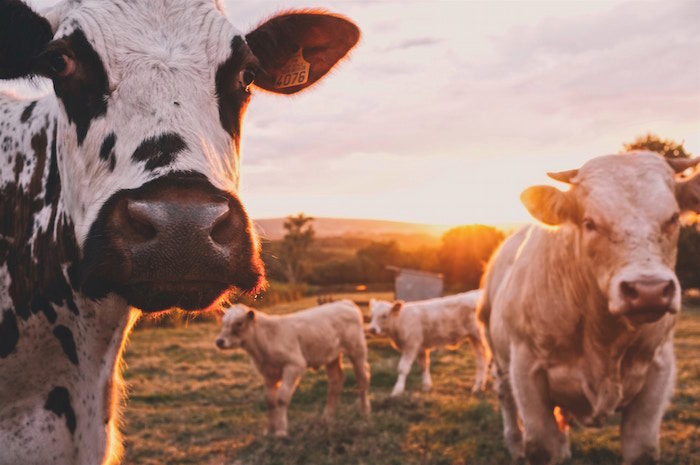 In my circle of sustainable bloggers, I have recently noticed a trend toward claiming that a meat-eating or omnivorous diet is more eco-friendly than a vegan diet. This certainly piqued my interest since I have a high respect for these people who are as passionate about ethical living as I am.
In my circle of sustainable bloggers, I have recently noticed a trend toward claiming that a meat-eating or omnivorous diet is more eco-friendly than a vegan diet. This certainly piqued my interest since I have a high respect for these people who are as passionate about ethical living as I am.
The study that the critics of veganism most often cite as proof that an omnivorous diet is more sustainable than a vegan one, is “Carrying Capacity of U.S. Agricultural Land: 10 Diet Scenarios” published in Elemental Journal. The researchers looked at US agricultural land divided into cultivated cropland, perennial cropland, and grazing land, and examined how much land is needed to support 10 different diet types, ranging from vegan and lacto-ovo vegetarian to omnivorous with increasing levels of meat intake.
A vegan diet doesn’t need perennial cropland or grazing land used for animals. But the study states that a vegan diet’s “carrying capacity,” or the number of humans that can be supported by land by area mass, falls at only 5th place, while lacto-ovo vegetarian diet is the highest. So is a vegan diet really less sustainable than a lacto-ovo vegetarian or an omnivore diet?
- The study doesn’t state that it’s using organic, free-range, and sustainable model of livestock farming. Based upon the fact that *some* livestock farming was found to be more high-yielding than vegan farming, I assume that the omnivore diets used in the study reflects the current standard of livestock farming–the type that uses the least landmass, aka factory farming. The *ethical* comparison of carrying capacity between diets would be more legitimate if the study used pasture-raised livestock model versus vegan.
- The study only uses land area as a metric for sustainability. It does not take into consideration the fact that livestock farming contributes 14.5% of all human-produced greenhouse gases, according to the Food and Agriculture Organization of the United Nations. 39% of livestock emissions is from digestive gases–yes, flatulence. Manure storage and processing is another 10%. These are outputs that are specific to livestock farming that vegan farming would avoid. (Ideal fertilizer for vegan farming would be compost from human food waste). Also consider antibiotics use and water pollution also associated specifically with animal farming.
- The land use examination also doesn’t bear into whether you think animals should be eaten at all. The reason I first became vegan was to not cause suffering to intelligent animals. This study only supports omnivore diet may be the more sustainable choice if you are subscribing to the idea that *most calorie production per area for the benefit of humans* is more valuable than not killing intelligent, social, and emotional living beings.
- According to a study published in Nature, organic farming yields anywhere from 13% to 34% less calories per landmass than conventional farming. But organic farming has obvious other benefits such as less energy used to load up the land with chemical fertilizers and less pollution. People who claim that they are ethical omnivores for sustainability reasons also adhere to an organic diet, which is paradoxical. If they prioritize land use over other metrics when measuring sustainability, why go for organic at all?
On a more macro-level, I have found “ethical omnivore” contingent also criticize vegans in following ways.
- “Vegan food is wrapped in plastic”–as a practicing vegan of 11 years, I haven’t discovered that a vegan diet necessitates more plastic consumption than a meat-eating one. Environmentally-conscious vegans already choose less packaged and less processed options: I, for one, make every grocery choice with an awareness of packaging, and 90% of what I buy isn’t packaged at all. Also, let’s be real, a greater percentage of vegans are environmentally-conscious than the percentage of omnivores. So throw stones somewhere else!
- “Vegans don’t take into account the indigenous communities / the fact that not everyone can be vegan”–far be it from claiming everyone should be Whole Foods vegans to save the world. Vegans are nuanced people–because they’re, like, people! I fully understand that in many different cultures in the world, raising–and yes, eating–animals is an ethical and sustainable choice–far more perhaps than my urban, developed world-style of vegan living. However, I still believe that for developed world dwellers such as myself who don’t raise their own food, vegan living is the most ethical and sustainable choice.
Sustainability is obviously a very complex problem; it’s something that requires many scientific metrics, plus ethical and philosophical questions both objective and subjective. I have noticed that the most vociferous critics of vegans are those who have tried a vegan diet and stepped away from it–but not because they were disillusioned with the environment-destroying effects of veganism, but because they found it “abstemious,” “restrictive,” or incompatible with their bodies. If that’s the reason they abandon veganism, I think there should be a clear admission rather than finding other faults with veganism that are not holistically supported. Conflating your health/emotional reasons for abandoning veganism with ecological reasons after the fact, isn’t quite fair, is it?
What are your thoughts on this land use study? Or veganism & sustainability in general?
__
Photo: Stijn te Strake on Unsplash
